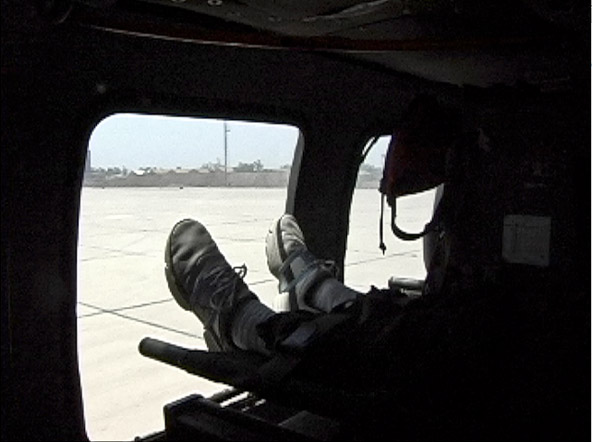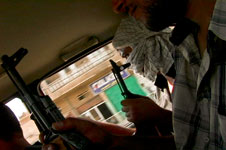
Taji, Iraq, June 2004. A U.S. Soldier is evacuated to a combat support hospital in the Green Zone. Modified Blackhawk helicopters ferried wounded men from front line positions to trauma centers in U.S. military bases. Casualties could be picked up, stabilized and seen by surgeons in a matter of minutes.
Video Still: Phillip Robertson
A single U.S. soldier walked across the street, apologized to the bystanders and took the rifle from the Iraqi soldier, dragging him back to the Bradleys. He said to him, "If you put your finger on that trigger, I will shoot you myself, OK?" The translator translated and the ICDC soldier, who was little more than a boy himself, nodded his head. They had shamed him.
After the ICDC soldier with the wounded sense of honor fired his rifle into the light and heat of Sadr City, we piled quickly back into the Bradleys and drove a few blocks until the vehicle in front of us threw a wheel and broke down. It was intensely depressing. No vehicle in the convoy could leave until the damaged machine could roll under its own power. To pass the time I talked to the kids who darted out to the median when they saw the U.S. soldiers. "Write 'Moqtada is good,'" a 9-year-old said. "Write it." I made a show of taking notes, then asked him his name. "Moqtada!" the thin kid with a shock of brown hair shouted. "My name is Moqtada!" The other boys laughed, elbowed one another and stared. I asked another young boy standing next to the first kid for his name. "Moqtada!" And you? "Moqtada!" Seven boys said their names were Moqtada, and thought it was most serious joke in the world. The seven Moqtadas vanished back into the alleys.
Meanwhile, the soldiers from Alpha Company were getting nervous at being exposed for such a long time on the street. Staying anywhere on the street longer than 15 minutes provokes great unease because that is roughly the amount of time it takes for the Mahdi fighters to find their positions. The crew of the broken-down Bradley couldn't fix the missing wheel, so we waited, surrounded by a growing mob. The U.S. soldiers were in combat positions waiting for incoming fire when Butler rolled up in his Bradley. Five minutes later, Butler and another sergeant named Pitts got the damaged machine moving again and we were free.
The next morning, Lt. Johnson, Butler's commanding officer, stood at the ramp of the one of the Bradleys with the other sergeants in the platoon. The pallid Johnson wears square glasses with thick black frames; he speaks in a monotone and mumbles. He was holding a map with the patrol route marked out in red ink. When he read the names of the streets -- Silver, Aeros, Maryland, Delta, Grizzlies, the American names for a grid of broad avenues in Sadr City -- the men leaning on the Bradley ramp all gasped. "Grizzlies? Not route Grizzlies. Oh, great, that's just fucking great," one soldier said.
The crew standing around the Bradley were sick with dread. Butler then asked Johnson directly, "You're sure about this?"
"Yeah," Johnson said without looking at him.
"You checked with the commander?"
"Well, it comes from headquarters, so the commander has to know about it."
"But you're sure about the route, this is what they gave you?"
Butler was trying to figure out who set up the patrol. Johnson said it wasn't his idea.
The crews of the four Bradleys in the platoon were watching Butler to see what he would say. Johnson was invisible to them.
"That's not a good route. I don't feel good about it," Butler said to Johnson.
The young lieutenant looked miserable and helpless but didn't change the plans; he adjusted his glasses. He was only the map bearer, the reluctant middle manager, who knew before he walked out to the crews that over much of the planned route they had been ambushed or hit by roadside bombs. One street on the route is known to be mined with improvised explosives.
Butler instantly understood that the officers in the operations center had given the 1st Platoon the worst patrol in the Shia ghetto, a loop around the entire northern side of the city. It was also a provocative one. The Bradleys would go within blocks of the al- Hekma mosque, a place where the al-Mahdi Army has laid many ambushes and constantly fires at American patrols. This mosque is the pulpit for al-Mahdi Army clerics on Fridays when the street fills with thousands of followers who pray outside in the sun. Angry sermons go out over the loudspeakers while young boys with water sprayers cool the kneeling crowd. Across the ruined avenue from the Hekma mosque someone had spray-painted VIETNAM STREET in tall black letters on a blank stretch of wall.
Al-Mahdi spotters with rifle scopes watch for the approach of American convoys from the roof of the mosque. Farther down the route, Butler would pass through the site of the April 4 ambush, where the men would get out of the vehicles and perform a snap checkpoint. At each of the stops, someone fired a few shots from a rifle. "When you hear that pop-pop from an AK, they are tracking you. That's how they tell everybody where you are," a gunner explained. The invisible men were watching us and holding their fire. Three hours later, the cease-fire hadn't collapsed and Butler's platoon had only had to endure a hail of rocks thrown by Iraqi boys. They had trouble believing their good luck.
An al-Mahdi Army fighter I know named Muhanned, a young man I met two months ago in a Sadr City safe house, had told me how he was fighting the Americans in the area around the Hekma mosque, the central meeting place for the Mahdi Army leaders. Muhanned is the leader of a cell of young men in his neighborhood who move around, mostly at night, waiting for U.S. patrols and then ambushing them. Muhanned's technique is to attack and then disappear into the alleyways. When I learned about Butler's routes through Sadr City, it was clear that there was a connection -- Muhanned and his cell were attacking Butler's company. Butler patrols the area around the mosque, as he has done for months, and Muhanned lives inside Alpha Company's area of operations, planning and executing ambushes. The two men are joined by the invisible current of the war but they do not know each other. In coming to know both men I cannot shake the feeling that the conflict in Sadr City is nothing more than an unnecessary machine for mass-producing grief.
The vehicles in the Camp Eagle graveyard tell part of the Alpha Company story: Humvees with blown-out windshields, direct hits with rocket propelled grenades on windshields and doors, two burned Bradleys, other Humvees destroyed by roadside bombs. Rocket impacts give the steel a moth-eaten look. The million-dollar equipment is ragged, pushed to the edge from overuse. A number of the soldiers from Alpha Company who were in them during the attacks talk about recurring nightmares, trouble sleeping. Butler said he still had dreams about April 4 and the other bad days that followed. I asked Butler if Iraq was what he expected. "I didn't think it would be like this. No one is going through what we are going through," he told me.
On the morning of June 28, the Coalition Provisional Authority announced the transfer
of sovereignty to Iraq, dissolving itself. It didn't amount to much beyond a political
abstraction for Butler. The only development that matters to him is the cease-fire.
Nothing else has changed -- he still has to take his platoon out on patrol, he still has
to worry about an armed insurgency and ambushes. "They just don't want us here," Butler
said. "I hope that all of us make it back. I pray that we all do, but I don't think it
could get any worse. This is worse. I'll do everything I can to bring all the soldiers
back. Anything."![]()
Sergeant Reggie Butler's determination to keep his men safe made him a hero of this story, there's no other word for it. After the piece ran, I received sharp criticism from senior officers but I believe it stands on its own.
No One is Going Through What We Are Going Through was originally published in Salon.com.
 LEAD IMAGE: 7 August, 2007, Baghdad, Iraq. Mahdi Army militiamen on patrol in a sector of the city shared by the First Cavalry Division. These men were involved in numerous actions against U.S. forces until a rickety ceasefire took effect. The ceasefire collapsed in late August and the militias under Moqtada al Sadr resumed fighting. Reggie Butler and his unit faced these men over a period of months.
LEAD IMAGE: 7 August, 2007, Baghdad, Iraq. Mahdi Army militiamen on patrol in a sector of the city shared by the First Cavalry Division. These men were involved in numerous actions against U.S. forces until a rickety ceasefire took effect. The ceasefire collapsed in late August and the militias under Moqtada al Sadr resumed fighting. Reggie Butler and his unit faced these men over a period of months.Video Still: Andrew Berends/Storyteller Productions
© Phillip Robertson, 2009-2014.
